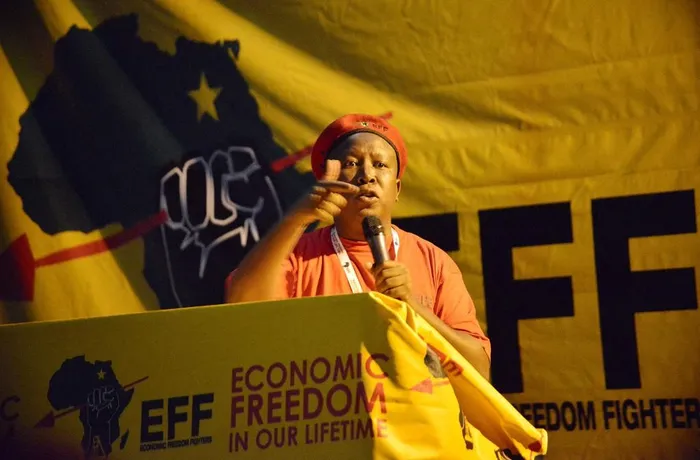Economic Freedom Fighters: A Beacon of Hope for South Africa's Forgotten Communities
EFF 12TH ANNIVERSARY

Julius Malema delivers a speech during the launch of his new political party Economic Freedom Fighters (EFF) on July 26, 2013 in Soweto. The EFF celebrates its 12th anniversary in Khayelitsha, Cape Town today.
Image: AFP
Carl Niehaus
As we celebrate the 12th anniversary of the Economic Freedom Fighters (EFF) today, we are filled with a sense of revolutionary pride.
This marks a celebration of a grassroots liberation movement that has been a beacon for the poor and marginalised African people, the oppressed, and the forgotten black masses of South Africa. Born from tragedy and injustice, the EFF represents the spirit of economic emancipation, turning despair into hope.
From Marikana’s bloodstained fields to Mthatha’s flood-ravaged homes, the party’s journey underscores its dedication to the poor over 12 years. In a landscape of empty promises, the EFF not only voices the forgotten’s plight but lives and fights it relentlessly.
The EFF’s origins are rooted in the nation’s sorrowful history, emerging from the 2012 Marikana massacre, where police killed 34 mineworkers during a wage strike. This exposed the exploitation of black labour in post-apartheid South Africa, which promised freedom but delivered inequality. The workers’ anguish sparked radical change.
On July 26, 2013, at Uncle Tom’s Hall in Soweto—a site of resistance—the EFF was launched, vowing economic freedom in our lifetime. This pledge to break inequality’s chains has been upheld with resolve for a dozen years.
Central to the EFF’s ethos are its Seven Cardinal Pillars, a blueprint to end systemic exploitation and injustice faced by black Africans. These include expropriating land without compensation, nationalising mines and banks, and providing free quality education, healthcare, and housing. They confront colonialism and apartheid’s scars, calling for wealth redistribution to empower the masses. For 12 years, these pillars have guided the EFF, inspiring actions aligned with the people’s needs.
Over these years, the EFF has become the champion of the African poor, oppressed workers, students, landless, unemployed, and exploited black women—not just in South Africa but across Africa. It extends solidarity to the continent’s forgotten, positioning itself as their voice. The party has led campaigns against gender-based violence, highlighting how patriarchy worsens poverty.
A key achievement was its role in the 2015-2016 Fees Must Fall movement, where students protested high fees barring access to education. The EFF provided strategic leadership, amplifying demands in Parliament and sparking a national reckoning. From this, a new generation of EFF leaders—youth from poor backgrounds—has emerged, carrying the torch with passion.
To the poor, the EFF is a lifeline and guardian of rights where service delivery fails. In local governance, EFF representatives have driven community upliftment in Ekurhuleni, Johannesburg, Tshwane, and other municipalities. They’ve fought for better housing, water, sanitation, and infrastructure against opposition.
Notably, the EFF advocates for the homeless in Alexandra, Soweto, Daveyton, Tembisa, Seshego, and townships nationwide, demanding land reclamation for self-empowerment. This aligns with the vision of people-owned land utilisation, transforming barren areas into prosperous communities.
The EFF consistently advocates for the black poor’s needs, from workplace exploitation and unemployment to university barriers and NYDA failures. In healthcare, it pushes for 24/7 community centres and clinics. In Johannesburg, MMC for Health Cllr Ennie Makhafola has established such facilities, ensuring timely care for the poor. MMC for Safety and Security Dr Mgcini Tshwaku has tackled drug lords, reclaimed crime-ridden buildings, and sensitised police to the poor’s vulnerabilities, prioritising township safety over wealthy suburbs.
The EFF is deeply rooted in communities, earning recognition as the party that cares and delivers justice. It addresses unfair dismissals, women’s exploitation, denied education, and unemployment through direct campaigns.
Under Commander-in-Chief Julius Malema, it challenges authority, echoing Marikana’s radical spirit. This was evident in opposing electricity tariff hikes; the EFF welcomed the rejection of Eskom’s 35% proposal, condemned approvals, and pressured for reviews. It fought the 2018 VAT increase from 14% to 15% as a burden on the poor and recently halted a 2025/26 proposal via legal challenges. The party also battles fuel price rises, fighting to block levy hikes through court action.
This purpose has made the EFF a target of vicious attacks from the political elite and monopoly capital, as it threatens their interests. No other party faces such misrepresentation, but the EFF remains undeterred in pursuing justice. In Parliament, the EFF advances transformative laws, like the 2025 Student Debt Relief Bill by MP Sihle Lonzi.
This Private Member’s Bill proposes a fund to erase debts under criteria, secure qualifications despite arrears, and democratise education for impoverished youth, addressing economic liberation barriers.
The EFF’s commitment has recently shone during the June 2025 Eastern Cape floods in Mthatha and beyond, which destroyed lives and homes. The EFF led aid efforts, with CIC Julius Malema embodying empathy.
Though the anniversary rally was planned for Mthatha, it was relocated to Khayelitsha in sensitivity to the victims’ suffering, worsened by poverty and ANC neglect. Instead, support initiatives were launched, putting people first.
This defines the EFF: a people’s movement elevating communities. As Frantz Fanon said, political education teaches the poor that everything depends on them, the EFF lives by this wisdom. In as much as our representation in legislature is considered low, we continue to do the work ourselves, letting communities know, from Marikana to Mthatha 12 years later, that they can depend on us.
* Carl Niehaus is an EFF Member of Parliament.
** The views expressed do not necessarily reflect the views of IOL, Independent Media or The African.